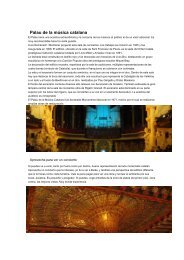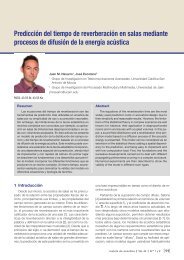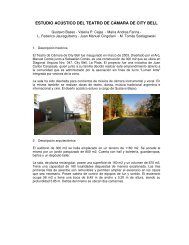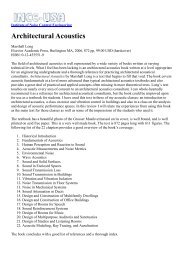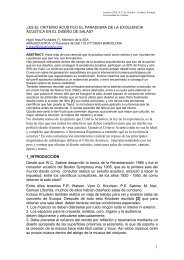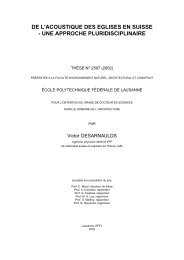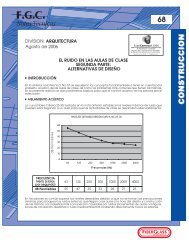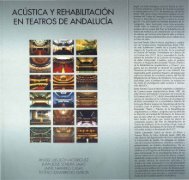Acoustics Bulletin Jul-Aug 2011 - Institute of Acoustics
Acoustics Bulletin Jul-Aug 2011 - Institute of Acoustics
Acoustics Bulletin Jul-Aug 2011 - Institute of Acoustics
Create successful ePaper yourself
Turn your PDF publications into a flip-book with our unique Google optimized e-Paper software.
INSTITUTE<br />
AFFAIRS<br />
Stolen equipment<br />
Description Location SRL no. Make Type serial no.<br />
Any information gratefully received<br />
Sound level<br />
analyser<br />
Altrincham 532 Brüel & Kjær 2260 2370478<br />
SRL Technical Services Ltd unfortunately had one <strong>of</strong> their sound level<br />
meters stolen in April <strong>2011</strong>. If any member has received an<br />
unorthodox approach and been <strong>of</strong>fered some or all <strong>of</strong> this equipment,<br />
please would they contact Ryan Arbabi in 0161-929 5585 or email<br />
rarbabi@soundresearch.co.uk. SRL’s northern <strong>of</strong>fice is at Lynnfield<br />
House, Church Street, Altrincham, Cheshire WA14 4DZ.<br />
Preamplifier Altrincham 537 Brüel & Kjær ZG-0026 2770<br />
Microphone Altrincham 550 Brüel & Kjær 4189 2616485<br />
Calibrator Altrincham 536 Brüel & Kjær 4231 2327011<br />
James Report under fire for failure<br />
IOA regrets failure to recognise the importance <strong>of</strong> acoustics<br />
The <strong>Institute</strong> <strong>of</strong> <strong>Acoustics</strong> has strongly criticised the Review <strong>of</strong><br />
Education Capital led by Sebastian James for its failure to recognise the<br />
importance <strong>of</strong> good classroom acoustics. Pr<strong>of</strong> Trevor Cox, the President,<br />
said that acoustics barely rated a mention in the 105-page report, which is<br />
absolutely incredible given its crucial role in the classroom. It may sound<br />
obvious to most people, but pupils has to be able to hear what their<br />
teachers were saying in order to learn, and teachers must not be obliged<br />
to put their health at risk by raising their voices to make themselves heard.<br />
There was a wealth <strong>of</strong> scientific evidence to show that external and<br />
internal noise affected children’s performance in literacy, numeracy and<br />
memory tasks, and that these effects could be reduced by good acoustical<br />
design. Children with special needs were more seriously affected by noise<br />
than others, as the impact on their performance in spelling and reading was<br />
three times that <strong>of</strong> the impact on other children.<br />
The <strong>Institute</strong> had hoped that the James Report would recognise the<br />
importance <strong>of</strong> acoustics somewhere in its findings so its failure to do so<br />
was extremely worrying. As a result the Department for Education was<br />
now being asked to give parents and teachers a firm and unequivocal<br />
assurance that acoustics would continue to remain a priority in schools.<br />
The <strong>Institute</strong> has been campaigning since the start <strong>of</strong> the year to ensure<br />
that the current review <strong>of</strong> Building Regulations by the Department for<br />
Communities and Local Government does not lead to a reduction <strong>of</strong><br />
acoustical design standards in schools.<br />
It is particularly concerned that section E4 <strong>of</strong> the regulations, which<br />
requires schools to be ‘suitable” acoustically, may be scrapped or watered<br />
down without being replaced by a statutory mechanism that carried<br />
equivalent weight.<br />
In February <strong>2011</strong> Pr<strong>of</strong> Cox warned Communities and Local Government<br />
Minister Andrew Stunell that failure to construct schools that were not fit<br />
for purpose could result in ‘disastrous consequences’ for future<br />
generations <strong>of</strong> schoolchildren.<br />
Classrooms with poor acoustics<br />
Children suffer an adverse impact on memory, reading and numeracy skills<br />
This is a précis <strong>of</strong> the article by Emily Dugan which was published in the<br />
Independent on Sunday on 22 May <strong>2011</strong>.<br />
According to a new study, children who are taught in noisy classrooms with<br />
poor acoustics suffer academically. While classroom chatter is unavoidable,<br />
many teachers and students suffer unnecessarily high levels <strong>of</strong> noise because<br />
badly designed classrooms exacerbate the problem, or because external<br />
noise sources from aircraft and road traffic are inadequately reduced by the<br />
building envelope.<br />
Government proposals to relax the standards to which school acoustics are<br />
considered in new or refurbished buildings when new school locations are<br />
selected could adversely affect pupils.<br />
The <strong>Institute</strong> <strong>of</strong> <strong>Acoustics</strong> and <strong>Institute</strong> <strong>of</strong> Education study took two groups<br />
<strong>of</strong> secondary-school students and exposed them to high and low levels <strong>of</strong><br />
noise while lessons were in progress. In the tests, half <strong>of</strong> each class listened<br />
to background noise at the equivalent <strong>of</strong> 50dB(A) through headphones while<br />
they worked, and the other half-class did the same with a headphones level<br />
<strong>of</strong> 70dB(A). Their positions were reversed after a week.<br />
The working memory, numeracy and reading skills <strong>of</strong> 14- to 16-year-olds in<br />
noisy conditions were no better than 11- to 13-year-olds’ performances in<br />
quiet conditions. Previous studies had shown in primary-school-age children<br />
that poor acoustical conditions adversely affected performances, but older<br />
pupils were also affected in the new study: this first compelling evidence <strong>of</strong><br />
the effects.<br />
Dr Daniel Connolly <strong>of</strong> the <strong>Institute</strong> <strong>of</strong> Education, says that the study showed<br />
poor acoustics to be very bad for learning. In many tasks, higher noise levels<br />
took the older age group back to the achievement levels <strong>of</strong> the younger age<br />
group. Although there would always be a certain amount <strong>of</strong> noise in a school,<br />
leaving students in a room with poor acoustics and high background noise,<br />
or both, could only make matters considerably worse.<br />
Education Department <strong>of</strong>ficials are reconsidering the requirement that<br />
schools are ‘suitable’ in terms <strong>of</strong> acoustics (BB93) as a part <strong>of</strong> the coalition<br />
government’s headlong gallop in pursuit <strong>of</strong> large cuts in public spending.<br />
The head teacher <strong>of</strong> Hounslow Heath Infant School, which is under the final<br />
approach path to Heathrow airport is Kathryn Harper-Quinn. She has direct<br />
experience <strong>of</strong> how important it is to protect a school from external noise.<br />
She says is it something the government should worry about, because<br />
significant problems will result from a failure to take school acoustics into<br />
account. Her school had taken several years to achieve adequate insulation<br />
against the noise <strong>of</strong> incessant aircraft over-flights to the extent that they were<br />
no longer a distraction, but she still felt there was a long way to go.<br />
A great improvement in pupil concentration had been apparent since the<br />
school building had been properly insulated, but it would have been far better<br />
to build schools where external noise was not an issue in the first place.<br />
Environmental Protection UK sponsors the initiative. Their Mary Stevens said<br />
that there was a big drive for deregulation at the moment, but the loss <strong>of</strong><br />
acoustical planning requirements for schools would mean the loss <strong>of</strong> valuable<br />
protection from noise, an this would have a serious impact on pupils and<br />
teachers alike.<br />
16 <strong>Acoustics</strong> <strong>Bulletin</strong> <strong>Jul</strong>y/<strong>Aug</strong>ust <strong>2011</strong>



